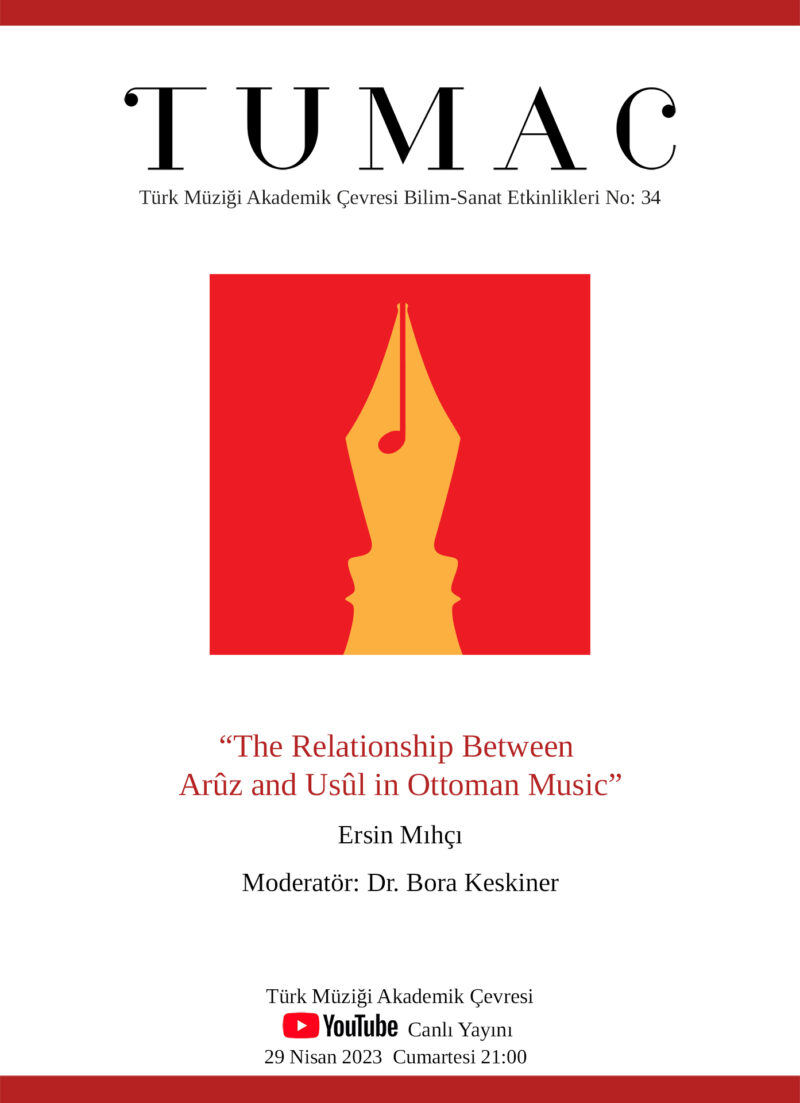
This event has passed.

TUMAC BSE No. 34: “The Relationship Between Arûz and Usûl in Ottoman Music” – Ersin Mıhçı
29 Nisan 2023 / 21:00 - 22:30
Türk Müziği Akademik Çevresi’nin (TUMAC) 2022-2023 akademik yılı Bahar Dönemi Bilim Sanat Etkinlikleri, Almanya Münster Üniversitesi Müzikoloji Bölümü tarafından yürütülen Corpus Musicae Ottomanicae projesinde araştırma görevlisi ve müzik editörü olarak görev yapan Ersin Mıhçı’nın “The Relationship Between Arûz and Usûl in Ottoman Music” başlıklı İngilizce sunumuyla devam ediyor. 29 Nisan 2023 Cumartesi günü saat 21:00’da (UTC+3) gerçekleşecek etkinlik, akademisyen ve divan edebiyatı uzmanı Dr. Bora Keskiner’in moderatörlüğünde TUMAC Youtube kanalından canlı yayınlanacak.
TUMAC Youtube canlı yayın linki için tıklayınız.
SUNUM HAKKINDA
The vocal repertoire of Ottoman makâm music is composed of three major elements: the makâm for the melodic expression, the usûl, which structures the composition in terms of time, and the arûz, which is the prosodic meter of the güfte or song lyrics. All these three elements seem to have been, in the past, essential for singers to perform by heart a repertoire that they had learned from their masters. Although primary sources do not give any comprehensive analysis of the relationship between usûl and arûz, more recent research has started examining this topic with a more scholarly approach. Whereas the arûz and usûl have mostly been studied by scholars of the respective disciplines – arûz in the field of literature studies, and usûl in the field of musicology – the presenter of this talk takes an interdisciplinary approach to searching for, finding and making visible the “hidden rhythmic pattern” that is produced by the interrelation of arûz and usûl. This talk will present a methodology, which is based on first-hand research that resulted from the scholarly edition of Ottoman vocal music, and will also suggest ways how other related fields of research might benefit from this approach, too.
Ersin Mıhçı
Ersin Mihci graduated from Heidelberg University with an M.A. in musicology and Spanish. He was accepted to the Graduate Programme in Transcultural Studies (GPTS) at the Cluster of Excellence Asia and Europe in a Global Context. He has defended his doctoral dissertation “Forging National Music on Both Sides of the Aegean in the 19th and 20th Centuries”, which focuses on how music in Greece and in the late Ottoman Empire contributed to the construction of national identities. Since 2015, he works as a research associate in the project Corpus Musicae Ottomanicae, where he edits and examines manuscripts containing Ottoman vocal music.
Afiş tasarımı: Orçun Güneşer
Calendar powered by The Events Calendar


Yorum Bırak